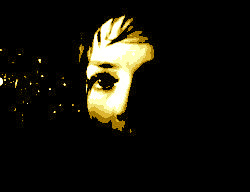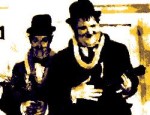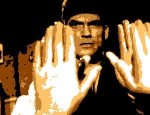Film Review
Jean-Gabriel Albicocco is most widely recognised today for his film
Le Grand Meaulnes (1967),
his lush and vivid adaptation of an essential work of French literature by
Alain-Fournier, but before this he made his mark with an even more flamboyant
work,
La Fille aux yeux d'or (a.k.a.
The Girl With the Golden Eyes).
Inspired by a short novel of the same title by Honoré de Balzac (from
his
Thirteen series), this film not only established Albicocco's credentials
as a promising auteur (one who was much nearer to the Italian New Wave of
Antonioni and Fellini than its already dwindling French counterpart), it
also helped to secure the international reputation of his muse and wife,
Marie Laforêt, who adopted the film's French title as her soubriquet.
By this time, Laforêt had already garnered attention for her roles
in two other prominent films - René Clément's
Plein Soleil (1960) and Marcel
Moussy's
Saint-Tropez Blues
(1961) - and a successful singing career was only just over the horizon.
With its wildly extravagant mise-en-scène (which manages to out-do
even Orson Welles'
The Trial,
released the following year) and equally grandiose cinematography (supplied
by the director's father Quinto),
La Fille aux yeux d'or is a film
that positive reeks of early 1960s decadence. Fellini's similarly themed
La Dolce vita (1960) is
laughably tame by comparison, and few other films made in France at the dawn
of 1960s capture the moment as intensely, as brazenly, as voluptuously as
this. Contrasting with the striking visuals is a relentlessly melancholic guitar score
that expresses, with such poignancy, the abject solitariness of the lost souls
inhabiting a world filled with stale pleasures but not one sliver of joy.
La Fille aux yeux d'or isn't just a film of its time,
it is one that boldly anticipates the cultural tsunami that would roll across
the West once the decade had got underway and the long years of post-war
austerity had finally been exorcised.
It is with astonishing ease that Albicocco transposes Balzac's 19th century
tale about a decadent wastrel falling foul of an
amour fou to swinging
Paris of the 1960s - not the Paris that most of us would recognise, but rather
one seen through a badly cracked distorting prism whilst under the influence
of psychedelic drugs - a chiaroscuro phantasmagoria woven into a suffocating
baroque fantasy. Albicocco plays with light and shade with greater
frenzy than Picasso ever played with colour, and the result is a head-splitting
whirlwind of subjective experience that forces you into the tight-fitting
shoes of the capital's debauched youth as they lunge from one hedonistic binge
to another, constantly seeking the fulfilment that never comes.
Lacking restraint in just about every department except modesty, Albicocco's
film is as frustratingly opaque as it is blisteringly perceptive, and if,
at times, it looks like a hollow festival of self-indulgent artistry on jet-propelled
roller-skates this is because it evokes so completely and so unapologetically
the sheer naked vacuity of the life that the post-war generation inherited
once materialism and the cult of the individual had arrived, sprouting from
the decomposing remains of an imposed morality that had had its day.
In his futile attempt to seek and possess the ideal woman, the film's central
protagonist Henri Marsav encapsulates the essence of what we, the children
of the Holocaust, would all become - spoiled brats, condemned to lead the
emptiest of lives in the most perfect of moral vacuums. If you are
disgusted by
La Fille aux yeux d'or this might be because what you
are seeing is the truest reflection of yourself.
© James Travers 2016
The above content is owned by frenchfilms.org and must not be copied.
Film Synopsis
Henri Marsav is a 20-something fashion photographer who revels in hedonistic
youth with his circle of equally debauched friends. Getting blind drunk
and abducting pretty girls that take their fancy are how Henri and his friends
get their kicks, but sometimes the game isn't worth the hunt. This
is the case of Katia, a model too willing to please - Henri is happy to leave
her to his friend Paul. A more interesting prospect presents itself
when Henri returns to his car one night and encounters an attractive young
woman he has never seen before. The girl, wild and mysterious with
her eyes of gold, exerts a strange fascination over the compulsive pleasure
seeker, and before he knows it Henri has become obsessed with the idea of
possessing her. Little does he know that she is the lesbian lover of
a former partner of his, Eléonore, and she has absolutely no intention
of giving her up...
© James Travers
The above content is owned by frenchfilms.org and must not be copied.



